Planning, organizing, and developing a wide range of training programs can be challenging, especially for businesses with remote workspaces. To address this issue, enterprise learning management systems have come into play that provide a centralized platform to manage and deliver training effectively. Since enterprise LMS systems are essential for organizations to adopt, this article sheds light on leading enterprise learning management system to optimize the learning process.
What is an Enterprise Learning Management System?
When defining enterprise learning management systems, one can say that they are software platforms designed to streamline management in companies. It is because they help companies deliver training content, track learners’ progress, and report employee training. Their key features might involve skill certifications, social learning, interactivity, mobile learning, gamification, cataloging of courses, and performance tracking.
Besides, these enterprise LMSs are custom-made software that can build mini-courses with interactive simulations and quizzes. Afterward, companies can track employees’ work progress through performance marketing tools and analyze whether they absorb new facts. LMS also lets learners log in and find their assignments on a particular object, where the administrator pulls reports of the training program.
Benefits of Enterprise LMS
When traditional training methods, such as in-person seminars and workshops, are time-consuming, enterprise LMS software shows up with several benefits. To stay informed in this ever-evolving business landscape, understand the advantages of learning management systems ahead.
- Reduce Learning Cost: Virtual classrooms and e-learning modules mean there is no need to maintain physical training spaces, as employees can learn sitting anywhere. Besides, digital materials can be updated at minimal cost because printing materials are no longer needed. As employees can learn at their own pace, it will reduce the need for overtime and extended work hours.
- Safe Storage: Since LMS platforms are cloud-hosted solutions, your learning content and teaching resources are saved in high-level online securities. Moreover, they include robust security measures such as access controls, encryption, and regular backups. For enterprises requiring strict adherence to regulatory standards, they ensure training content is stored with legal compliance.
- Better Engagement: The best enterprise LMS systems usually support various interactive content, such as simulations, quizzes, video tutorials, and gamification. Additionally, they enable social networking and discussion boards to foster a collaborative learning environment and encourage exchanging ideas.
- Strategic Content Management: An LMS allows enterprises to update content and ensure employees only access updated information through its version control features. It also allows the administration to categorize content by topics, departments, and designations so employees receive relevant training.
- Customizable Learning: Enterprise LMS systems use adaptive learning technology that adjusts the content based on the difficulty level and the learner’s performance. Furthermore, they have multilingual support to foster learning regardless of language frequency and location. LMS also allows companies to customize their LMS and align with their logo, color scheme, and brandings.
Extended vs Traditional Enterprise LMS
An enterprise learning management system not only enhances the efficiency of training programs but also contributes to an adaptable workspace. If you want to explore it in detail, let us remind you that it is divided into two categories: Traditional and Extended Enterprise LMS. To learn about them, you can review the following table, which clarifies their differences for easy comprehension of concepts.
| Traditional Enterprise LMS | Extended Enterprise LMS | |
| Focus | It is primarily designed to serve internal employees of an organization. | It supports the learning of a broader audience, including customers, vendors, distributors, and external partners. |
| Content | They cater to internal training needs, such as onboarding, compliance training, and leadership development. | They offer various content, including product training, customer education, and partner certifications. |
| Access | Their access is granted through secure company networks and VPNs to protect internal information. | Their access can be given to different devices and locations, often involving self-registration and different access levels. |
| Compliance | These only focus on completing necessary compliance training related to company policies and regulations. | These support compliance training for external stakeholders, vendors, and partners. |
| Monetization | Its primary purpose is to reduce costs and improve employee performance where no direct revenue generation is involved. | Conversely, it uses a revenue-generating tool when providing training for certification to partners and customers. |
| Integration with Other Systems | Typically, they can integrate with HRIS and ERP systems. | They can integrate with CRM platforms, partner portals, eCommerce solutions, and marketing automation tools. |
How to Choose Enterprises LMS
According to a report published in February 2022, nearly 87% of companies use at least one enterprise learning management system. Therefore, let us help your business flourish by choosing the best LMS systems through the following points.
- Define Your Goals: With hundreds of LMS available in the market, it’s important to start with a precise selection. For this purpose, get crystal clear about your goals and question yourself about what you want to achieve from training. You can structure your objectives, likewise, educating staff on new products or training them on efficient sales techniques.
- Identify Your LMS Requirements: Once you know why you need an LMS, decide whether you need a cloud-based, industry-specific, or open-source LMS. Businesses tend to select cloud-based and commercial LMSs because they strike the right balance between ease of use, cost, and functionality.
- Features & Functionality: Distinguish between must-have and nice-to-have features in LMS enterprises that are essential for the success of training programs. Here, you can look for tracking, reporting, security, technical support, content management, and creation features. Besides, you must add gamification, social learning, and custom branding options to your feature goal list.
- Evaluate Vendors: Now, it is time to conduct a market analysis and search for top-rated LMS platforms that fulfill your requirements. In this regard, you can contact industry experts or browsers through vendors’ websites to check their pricing models and product information.
- Integrations: Finally, you must ensure the potential enterprise LMS software can integrate with your existing systems. This could broaden your learning technologies stack and your business’s IT infrastructure. Furthermore, you are advised to pick a technology that supports common eLearning standards and formats like xAPI and SCORM.
What Features Should Enterprise LMS Look for?
Global learning management systems show dynamic expansion year by year, and they are currently valued at $4,383.84 million. Meanwhile, according to research, the projected number of LMS is 73.8 million, but their features differ. This section will show some essential features of enterprise LMS systems, without which your learning activities couldn’t smoothen.
1. Analytics and Reporting
First, an LMS system must have advanced analytics, enabling organizations to gather and analyze data from various aspects of training programs. Plus, comprehensive reporting capabilities are also important, along with customization to generate detailed reports.
2. Security and Compliance
While managing enterprise data, security is a paramount concern, so LMS systems must include robust security measures to protect sensitive data. Besides, they must support training programs to educate employees about company policies and regulations with complete activity tracking.
3. Collaboration Tools
According to a report by Bersin, nearly 37% of employees’ productivity increases when an organization uses social learning techniques. Therefore, an enterprise LMS should incorporate social learning and collaboration tools with peer-to-peer learning, social media integration, and collaborative projects.
4. Mobile Compatibility
In today’s mobile-centric world, LMS must be compatible with various mobile devices to ensure learners can access training materials anywhere. A mobile-friendly LMS supports responsive designs and comes up in dedicated mobile apps for seamless learning on tablets and smartphones.
5. AI and Machine Learning
Since artificial intelligence and machine learning are changing corporate learning, an LMS system should leverage these technologies. It can personalize the learning experience, suggest relevant content, or summarize complex concepts to enhance the overall experience.
6. Gamification
Gamification is another innovative feature that significantly enhances learner engagement, as 89% of learners feel motivated through it. It may involve game-like elements such as badges, leaderboards, rewards, and points after training programs.
10 Best Enterprise LMS to Use
A training magazine report shows that 81% of enterprises handle their LMS administration in-house, while 30% outsource their LMS hosting and operations. Nevertheless, the following are the top 10 enterprise learning management systems your company can choose from.
1. CYPHER Learning
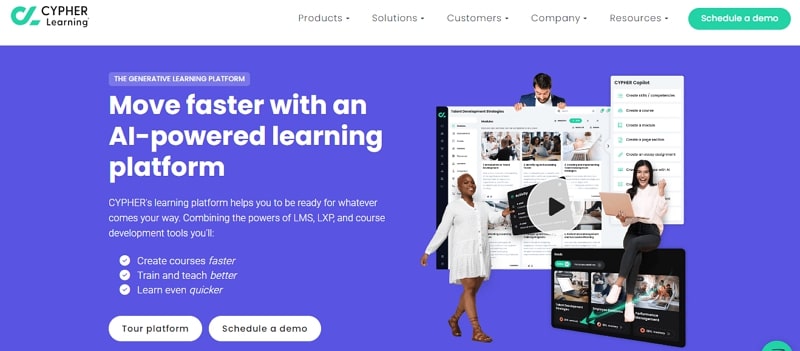
Featuring graphical dashboards and adaptive learning methods, CYPHER Learning is based on a human-centric approach to enhance user clarity. It supports competency-based learning with CBL methods to ensure users have in-depth knowledge of each skill. Moreover, it has an enrollment trigger that automates users to ensure they enter the course promptly.
Once the course is started in a structured manner, you will have the option to lock or unlock it to maintain engagement and steady progress. Upon course completion, you will be automatically rewarded with customized PDF certificates filled out by the CYPHER platform.
Pros
- This platform supports over 50 languages to encourage cross-language communication among users.
- With its SSL certificate hosting options, you can secure your custom sites from potential threats while learning.
Con
- Its extensive range of features and customization options can be overwhelming for amateurs.
Pricing Plans
- Contact sales
2. EducateMe
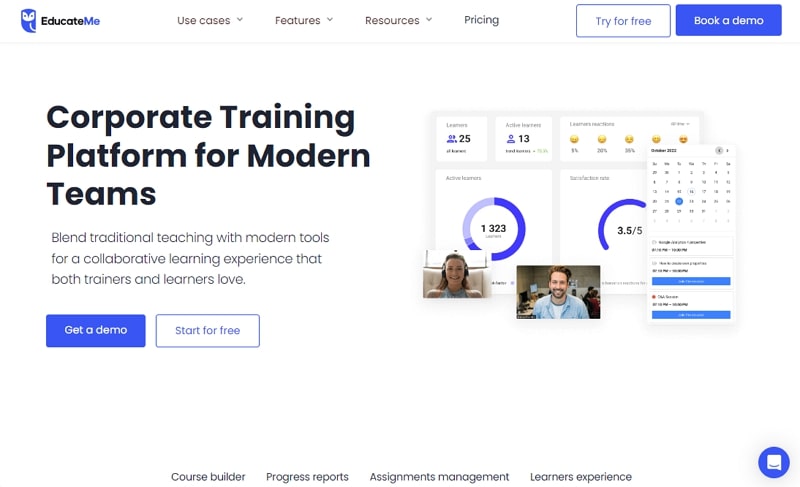
This enterprise LMS platform is designed with engaging tools, such as automated submission tracking, that boost learners’ motivation while learning. Whether you desire to create quizzes or interactive lessons, it offers hassle-free content creation by choosing the desired format. When the course is designed, use its smooth assignment creation feature to arrange data on a single screen.
Furthermore, there is a built-in progress tracker through which one can record the learner’s performance. Instead of working on baffling spreadsheets to give feedback, use the automated reporting tool to give remarks. Finally, to keep users focused on what’s important, a calendar is installed to record deadlines and milestones.
Pros
- By utilizing its custom branding tool, users can tailor their learning platform to uniqueness and enhanced motivation.
- As it facilitates community-based learning, it allows users to interact with other learners to foster collaboration.
Con
- EducateMe might struggle with many users and courses, limiting options for organizations that focus on large-scale needs.
Pricing Plans
- Advanced: $100 per month
- Pro: $200 per month
- Enterprise: Custom price
3. Tovuti LMS
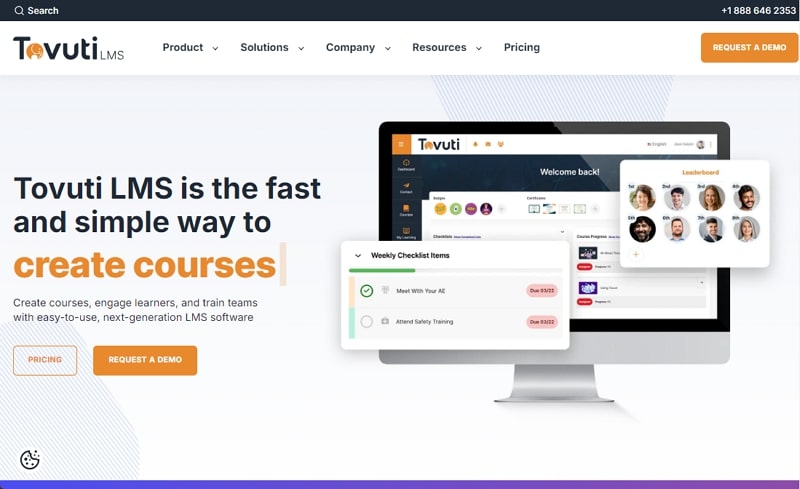
Leveraging revolutionary integration features, Tovuti enterprise LMS systems allow users to connect with leading platforms like BambooHR for enhanced efficiency. Once integrated, generate bite-size content from scratch or in existing videos to improve the learner’s retention. For that, get assistance from AI to create either a complete course or simple quizzes in the snap of a finger.
Having all these features, this LMS platform is mobile-friendly, meaning it is the finest solution for users who seek on-the-go options. Hence, make use of its customizable learning portal to engage learners with interactive activities, multimedia, and quizzes for better learning.
Pros
- After completing the course, Tovuti LMS offers users badges and certificates to validate their skills.
- Its intuitive activity dashboard keeps track of the learner’s progress by reviewing transcripts in detail.
Con
- Its free version limits the accessibility of many tools that affect integration and consultation services.
Pricing Plans
- Contact Sales
4. Docebo
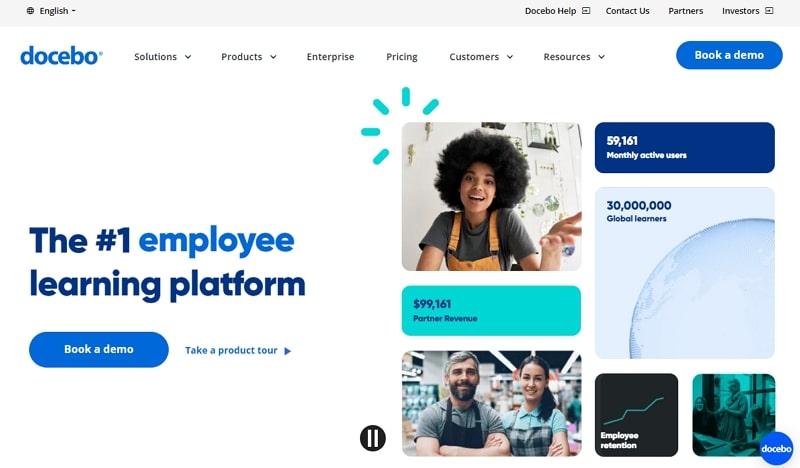
Having focused on gamified learning, this is another one of the best enterprise LMSs that takes a boring learning system to the next level. By generating games like JEOPARDY and Wheel of Fortune, users can easily create a virtual gamified lesson for effective learning. It is not just lessons; one can also employ its content creation tool to make a globally accessible substance using AI translations and voiceovers.
Other than learning, this platform offers the feasibility of opening an online store by building learning programs and keeping track of your performance. After you’ve generated your store, familiarize yourself with communities and share your insight with them for better engagement.
Pros
- It focuses on immersive learning that offers interactive and real-world experiences to enhance learner retention.
- There is an analytics dashboard that displays detailed behavioral trends and the effectiveness of training to track performance.
Con
- Its basic version lacks a custom dashboard, meaning users can’t tailor the dashboard to the way other platforms do.
Pricing Plans
- Contact Sales
5. 360learning
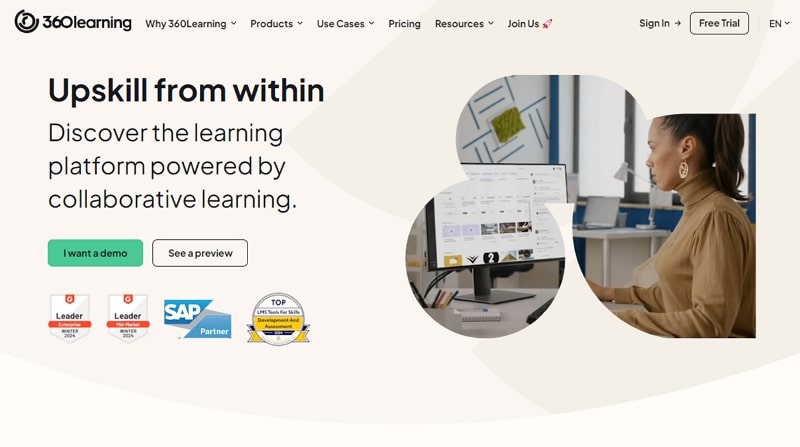
Whether your aim is employee onboarding or sales enablement, this enterprise LMS is designed with AI-driven tools. From building courses to suggestion questions for assessments, its AI has got you covered to create engaging content in real time. Moreover, for enhanced performance, learners can collaborate with expert coauthors to get instant feedback on their performance.
In addition to that, there is an integration hub that lets you connect with reputable digital agencies to streamline workforce planning. Alongside all these traits, one can get hold of live sessions and coaching programs to get real-time guidance for effective learning.
Pros
- Its LXP improves learner engagement by offering personalized learner-centric experiences.
- This LMS platform features bulk import, through which you can handle more than one file to create compelling content.
Con
- Though it supports innovative LMS and LXP features, it lacks a calendar tool to let users set reminders of tasks.
Pricing Plans
- Team: $8/per month
6. GoSkills
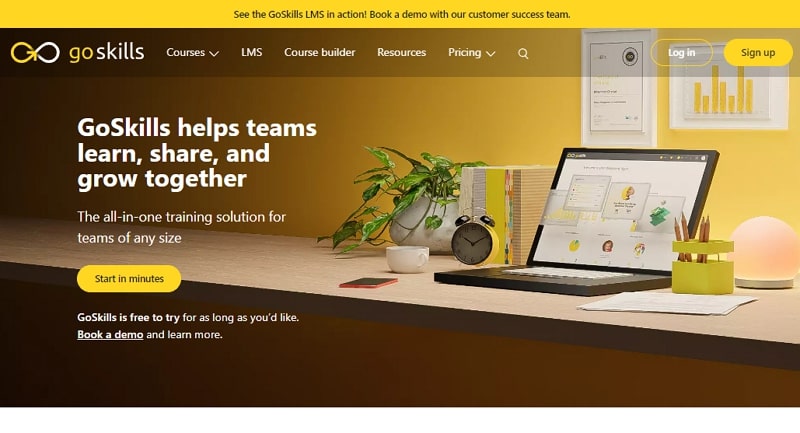
With GoSkills enterprise LMS software, get ahold of its course builder to generate engaging learning materials that suit your needs and preferences. While designing a course, you can choose the desired template from its extensive format library to streamline content creation. Moreover, while setting the course, you customize the training program by splitting the data into understandable sizes to improve the user’s readability.
If your goal is to accommodate a wide range of learners in your training program, unlike other platforms, GoSkills does not limit. This means that you have the flexibility of accommodating users to upscale your learning circle.
Pros
- This LMS platform offers you the ease of publishing content to enhance course accessibility for learners.
- Its intuitive interface makes it easy to use, offering seamless navigation of tools, even for beginners.
Con
- If you seek to collaborate with other platforms, GoSkills lacks integration capability, which affects collaboration among users.
Pricing Plans
- Monthly: $39
- Yearly: $21/month
7. Absorb LMS
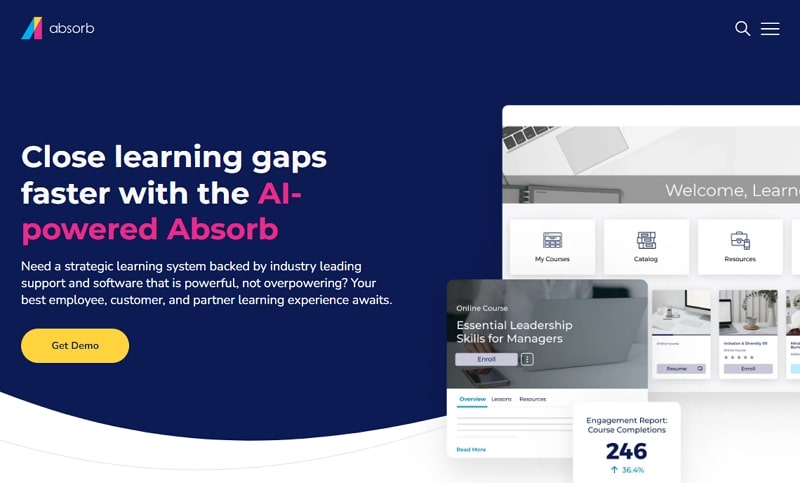
Absorb LMS can be easily accessed on mobile phones if you are looking for a compatible platform, making it an ideal go-to enterprise LMS. Harnessing AI capabilities, whether you want to generate engaging content or design a complete course, this tool takes off your manual effort. Alongside that, there are over 20,000 courses that cover all the industries.
Hence, instead of creating a course from scratch, select the desired template and customize it accordingly using its AI capabilities. Sometimes, while training earners breach the contract, it is better to sign off on essential requirements to maintain professionalism.
Pros
- There is an observation check tool that allows you to automatically monitor the learners’ performance to ensure that records are up to date.
- With a revolutionary integration tool, users can collaborate with multiple platforms like Zoom or BambooHR.
Con
- You will have to buy the Data Analytics module separately to have in-depth information.
Pricing Plans
- Contact sales
8. TalentLMS
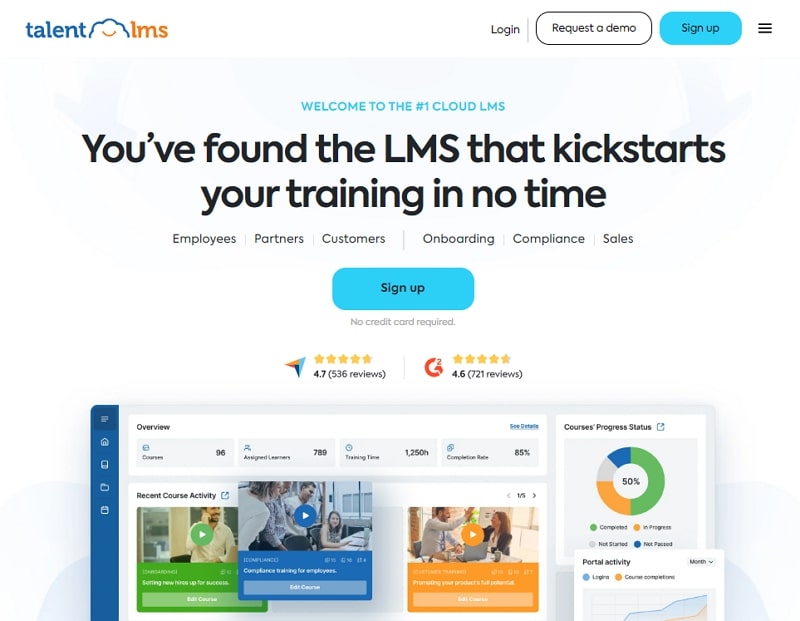
Among the list of LMS enterprises, TalentLMS covers a wide range of training programs, making it a versatile platform. From healthcare to manufacturing industries, users can create engaging courses for sales or employee training.
No matter the use case you opt for, its AI content generation capability is there to make things easier. Simply by giving the command to AI, one can get completely designed content to complete courses. After you’ve generated the course, you can restrict learners from viewing or completing it if they want to quit beforehand.
Pros
- To preserve the data for future preferences, its file repository ensures the safeguarding of the courses from selected users.
- There is an assessment engine that lets you generate a variety of tests such as quizzes, deeded questions, or fill-in-the-blanks.
Con
- Users have to generate courses from scratch as there might be limited built-in course templates.
Pricing Plans
- Core: $89/month
- Grow: $ 139/month
- Pro: $ 179/month
9. Moodle
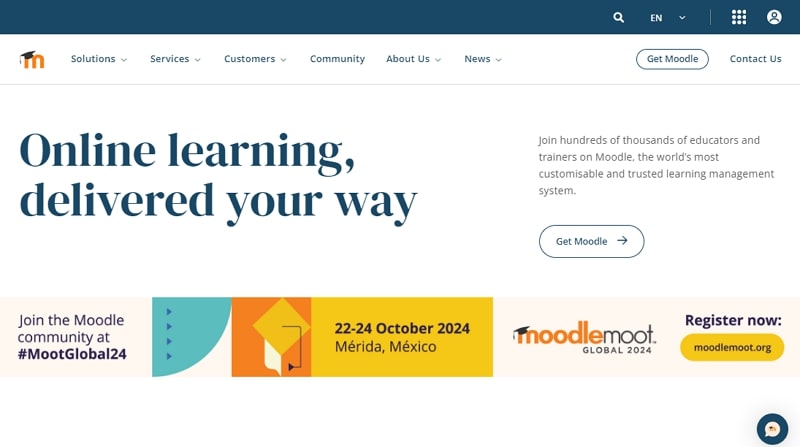
If you wish to introduce engaging and personalized enterprise learning management systems (LMS) in your business, you can explore the Moodle LMS system. It is specially designed for K-12 classrooms and multi-campus universities to improve teaching and student outcomes with active learning principles. Besides, it supports more than 160 languages and mobile versions to facilitate learning anywhere and for everyone.
To foster social learning, it enables web conferencing, assignments, and workshops with an updated calendar and notifications. Additionally, it integrates gamification elements such as leaderboards, interactive games, and virtual coins.
Pros
- From small classrooms to large universities, this LMS system is highly scalable for organizations of all sizes.
- The presence of built-in features and integrations facilitates a highly customizable learning environment.
Con
- Some users claim that its crowded interface and limited media content support make it difficult for new LMS operators to use.
Pricing Plans
- Standard Starter Plan: $130/annually
- Standard Mini Plan: $220/annually
- Standard Small Plan: $400/annually
- Standard Medium Plan: $920/annually
- Standard Standard Plan: $1,750/annually
10. Skyprep
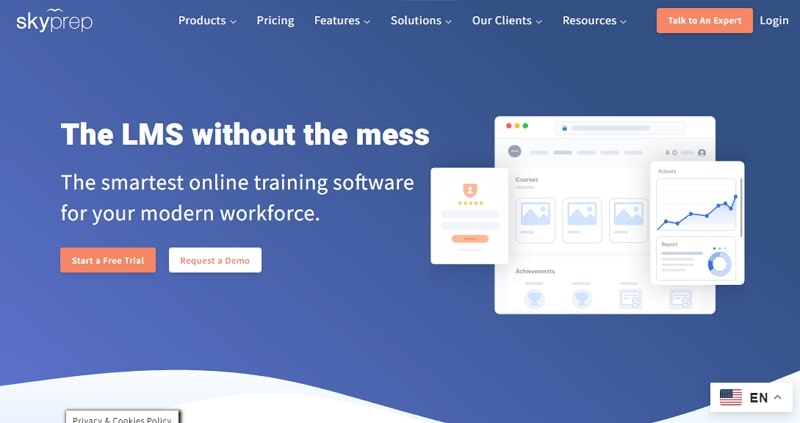
Let’s end the discussion of the best enterprise LMS with Skyprep, a smart online training software for modern workspaces. It automates training by facilitating distance learning capabilities, whether you are onboarding employees or conducting customer or compliance training.
Regarding features, it offers gamification for user engagement and assessments and checklists for course creation. Moreover, it can integrate with business tools such as Zoom, ADP, and Google. This enterprise LMS software also contains enterprise-grade security models to keep your data safe.
Pros
- This LMS system enhances the learning experience through AI and simplifies content creation for all.
- Users can also customize this LMS based on their branding themes, logo, and certifications.
Con
- Since its customer support communicates with emails, users find it annoying when they need back-and-forth assistance.
Pricing Plans
- Lite, Premium, and Enterprise Learning Suit: Contact Sales
How ZEGOCLOUD Empowers Developers to Build a Robust Enterprise LMS
In the competitive landscape of enterprise learning management system, creating a platform that is both scalable and feature-rich is essential. ZEGOCLOUD provides developers with the tools and flexibility needed to build a robust LMS that meets the diverse needs of modern enterprises.
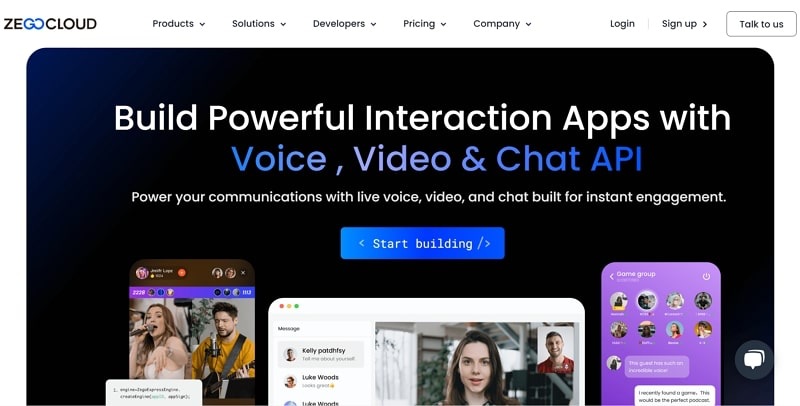
By choosing this communication solution, employers can add live-streaming features for immersive training experiences. In this regard, they can benefit from a screen-sharing option that showcases learning content to all participants with less than 300ms latency. Despite that, there are video and audio conferencing APIs and SDKs so employees can conduct group calls and one-on-one discussions.
Besides, there is an in-app chat feature to facilitate media attachment exchange, public channels, and group management options. ZEGOCLOUD APIs and SDKs also give cloud recording options so trainers can upload recorded sessions and employees can take screenshots.
Conclusion
To sum up, enterprise learning management systems are crucial for employee training while eliminating costly traditional methods. This article has highlighted 10 leading enterprise LMS software, their pricing, pros, and cons to help you choose the right one. According to expert suggestions, you must integrate ZEGOCLOUD communication APIs and SDKs in your LMS systems to foster matchless social learning experiences.
Read more:
FAQ
Q1: What are the key features to look for in an enterprise LMS?
Key features to look for in an enterprise learning management system include scalability to support a growing number of users, robust data security measures, comprehensive reporting and analytics tools, mobile compatibility for learning on the go, and integration capabilities with other enterprise software systems such as HRMS and CRM platforms.
Q2: Can an enterprise LMS support compliance training?
Yes, one of the primary uses of an enterprise learning management system is to deliver and track compliance training across the organization. It can ensure that all employees receive mandatory training, maintain records of completion, and generate reports for audit purposes. This is crucial for industries that are highly regulated, such as healthcare and finance.
Q3: What are the benefits of implementing an enterprise LMS?
Implementing an enterprise learning management system can lead to significant benefits, including streamlined training processes, improved training outcomes, enhanced employee engagement and retention, the ability to deliver consistent training across all levels of the organization, and reduced training costs through more efficient management of learning resources and better scalability.
Let’s Build APP Together
Start building with real-time video, voice & chat SDK for apps today!










